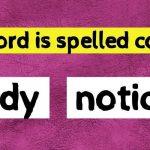You may think you’re nice, but how nice are you? People say it’s important to be kind but where do you fall on the scale of niceness?This Word Association Test Will Reveal How Nice You Are
Quiz: We’ll Reveal How Nice You Are with the Association Test
Are you curious about how nice you are? Take our association test and find out! This quiz is designed to reveal your true nature and determine just how kind and considerate you really are.
The association test is a fun and interactive way to explore your personality traits. It works by presenting you with a series of words and asking you to associate them with either positive or negative emotions. Your responses will be analyzed to determine your level of empathy, compassion, and overall niceness.
So, are you ready to discover just how nice you really are? Take our association test today and find out!
Whether you're looking to gain insight into your own personality or simply want to have some fun, our quiz is the perfect way to do it. With just a few clicks, you can gain a deeper understanding of yourself and your relationships with others.
So why wait? Take our association test today and see just how nice you really are!





